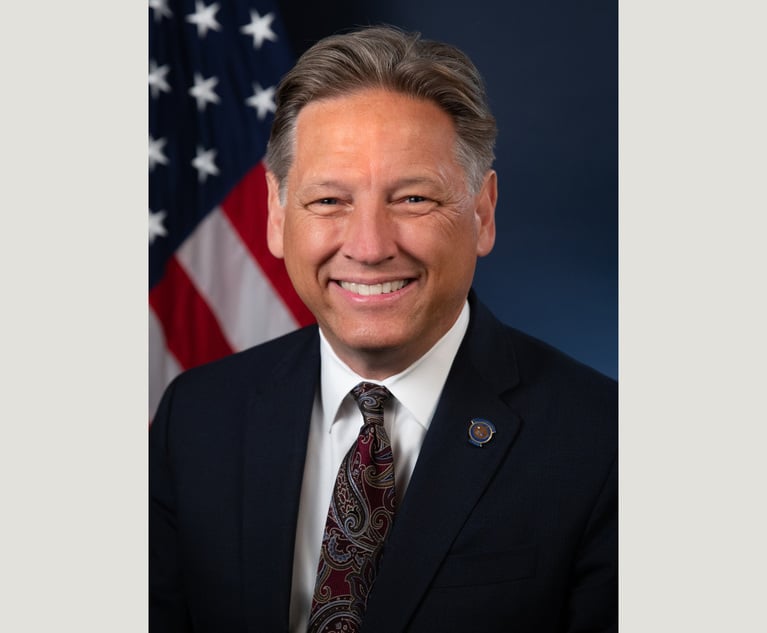US Justice Dept. Loses Another Sanctuary City Ruling
The U.S. Department of Justice "fails to explain adequately the reasons it imposed the challenged conditions," U.S. District Judge William Orrick III in San Francisco wrote.
October 05, 2018 at 05:32 PM
3 minute read
 Judge William Orrick III, U.S. District Court for the Northern District of California. S. Todd Rogers / ALM.
Judge William Orrick III, U.S. District Court for the Northern District of California. S. Todd Rogers / ALM.
The Trump administration on Friday lost another attempt to block states' so-called sanctuary laws when a federal judge struck down conditions the U.S. Department of Justice placed on law enforcement grants.
In siding with attorneys for the city of San Francisco and the state, U.S. District Judge William Orrick III of California's Northern District said federal mandates that local agencies cooperate with federal immigration officials to receive crime-fighting money violate separation of powers and congressional spending authority provisions in the Constitution.
Orrick noted that his findings were “in agreement with every court that has looked at these issues.”
The U.S. Department of Justice “fails to explain adequately the reasons it imposed the challenged conditions,” Orrick wrote. “Its own justifications cannot 'be ascribed to a difference in view or the product of agency expertise'; the record demonstrates the lack of evidence supporting its position, that it failed to consider important problems with its conditions and has repeatedly offered explanations that are counter to the evidence.”
Orrick issued—but then put on hold—a nationwide injunction barring enforcement of the grant conditions “until the Ninth Circuit is able to address it in the normal course on appeal.”
The ruling is the latest blow to federal efforts to stop cities, counties and states from limiting cooperation with federal immigration enforcement officials.
Last month, the U.S. Court of Appeals for the Ninth Circuit affirmed a separate ruling by Orrick blocking President Donald Trump's executive order to cut grant funding from sanctuary cities and states. In July, a federal judge in Sacramento upheld most of California's newly enacted statutes aimed at shielding undocumented immigrants. The cities of Philadelphia and Chicago have also successfully challenged the Justice Department's grant-limiting policies.
“The Trump administration should spend less time villainizing immigrants and more time reading the Constitution,” San Francisco City Attorney Dennis Herrera said in a statement. “Congress has the power of the purse, not the president. These unconstitutional grant conditions were yet another example of presidential overreach.”
California Attorney General Xavier Becerra said last year that the grant conditions the Justice Department sought to impose would put $28.3 million in law enforcement funding at risk statewide.
The Department of Justice did not immediately respond to a request for comment.
Orrick's ruling is posted below:
This content has been archived. It is available through our partners, LexisNexis® and Bloomberg Law.
To view this content, please continue to their sites.
Not a Lexis Subscriber?
Subscribe Now
Not a Bloomberg Law Subscriber?
Subscribe Now
NOT FOR REPRINT
© 2025 ALM Global, LLC, All Rights Reserved. Request academic re-use from www.copyright.com. All other uses, submit a request to [email protected]. For more information visit Asset & Logo Licensing.
You Might Like
View All
After Solving Problems for Presidents, Ron Klain Now Applying Legal Prowess to Helping Airbnb Overturn NYC Ban
7 minute read
DOJ, 10 State AGs File Amended Antitrust Complaint Against RealPage and Big Landlords
4 minute read
Pentagon Settles Suit Seeking to Clear Records of Service Members Discharged for Being LGBTQ
3 minute readTrending Stories
Who Got The Work
Michael G. Bongiorno, Andrew Scott Dulberg and Elizabeth E. Driscoll from Wilmer Cutler Pickering Hale and Dorr have stepped in to represent Symbotic Inc., an A.I.-enabled technology platform that focuses on increasing supply chain efficiency, and other defendants in a pending shareholder derivative lawsuit. The case, filed Oct. 2 in Massachusetts District Court by the Brown Law Firm on behalf of Stephen Austen, accuses certain officers and directors of misleading investors in regard to Symbotic's potential for margin growth by failing to disclose that the company was not equipped to timely deploy its systems or manage expenses through project delays. The case, assigned to U.S. District Judge Nathaniel M. Gorton, is 1:24-cv-12522, Austen v. Cohen et al.
Who Got The Work
Edmund Polubinski and Marie Killmond of Davis Polk & Wardwell have entered appearances for data platform software development company MongoDB and other defendants in a pending shareholder derivative lawsuit. The action, filed Oct. 7 in New York Southern District Court by the Brown Law Firm, accuses the company's directors and/or officers of falsely expressing confidence in the company’s restructuring of its sales incentive plan and downplaying the severity of decreases in its upfront commitments. The case is 1:24-cv-07594, Roy v. Ittycheria et al.
Who Got The Work
Amy O. Bruchs and Kurt F. Ellison of Michael Best & Friedrich have entered appearances for Epic Systems Corp. in a pending employment discrimination lawsuit. The suit was filed Sept. 7 in Wisconsin Western District Court by Levine Eisberner LLC and Siri & Glimstad on behalf of a project manager who claims that he was wrongfully terminated after applying for a religious exemption to the defendant's COVID-19 vaccine mandate. The case, assigned to U.S. Magistrate Judge Anita Marie Boor, is 3:24-cv-00630, Secker, Nathan v. Epic Systems Corporation.
Who Got The Work
David X. Sullivan, Thomas J. Finn and Gregory A. Hall from McCarter & English have entered appearances for Sunrun Installation Services in a pending civil rights lawsuit. The complaint was filed Sept. 4 in Connecticut District Court by attorney Robert M. Berke on behalf of former employee George Edward Steins, who was arrested and charged with employing an unregistered home improvement salesperson. The complaint alleges that had Sunrun informed the Connecticut Department of Consumer Protection that the plaintiff's employment had ended in 2017 and that he no longer held Sunrun's home improvement contractor license, he would not have been hit with charges, which were dismissed in May 2024. The case, assigned to U.S. District Judge Jeffrey A. Meyer, is 3:24-cv-01423, Steins v. Sunrun, Inc. et al.
Who Got The Work
Greenberg Traurig shareholder Joshua L. Raskin has entered an appearance for boohoo.com UK Ltd. in a pending patent infringement lawsuit. The suit, filed Sept. 3 in Texas Eastern District Court by Rozier Hardt McDonough on behalf of Alto Dynamics, asserts five patents related to an online shopping platform. The case, assigned to U.S. District Judge Rodney Gilstrap, is 2:24-cv-00719, Alto Dynamics, LLC v. boohoo.com UK Limited.
Featured Firms
Law Offices of Gary Martin Hays & Associates, P.C.
(470) 294-1674
Law Offices of Mark E. Salomone
(857) 444-6468
Smith & Hassler
(713) 739-1250







